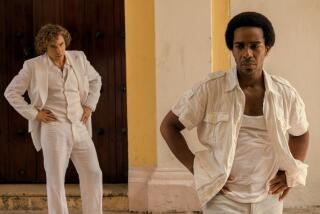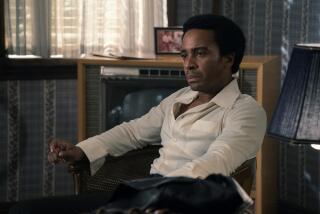Huey Newton Found Shot to Death on Oakland Street : Black Panthers Founder Killed in High Drug Area
- Share via
OAKLAND — Huey P. Newton, a leading proponent of African-American militancy in the 1960s and a co-founder of the radical Black Panther Party for Self Defense, was shot three times in the head and killed early this morning in a West Oakland neighborhood plagued by violence and crack cocaine.
Oakland police declined to speculate on a motive for the killing, although Newton, 47, had a history of cocaine abuse and had been sentenced to 90 days in San Quentin Prison earlier this year for possessing drug paraphernalia, a violation of parole in an earlier case.
“We had a call of gunshots in the area,” Oakland Detective Dan Voznik told United Press International. “He was found in the street and pronounced dead at a local hospital.”
Voznik and other detectives refused further comment until later today.
Critically Injured
Phyliss Brown at Highland Hospital in Oakland said Newton was brought to that major emergency facility at 5:50 a.m. critically injured with multiple gunshot wounds in the head. She said he was pronounced dead at 6:12 a.m.
Although Newton did not live in the 9th Street neighborhood where he was shot, he frequently visited the area, said Jules Ayo, 54, who said he lived a few doors away from the bloodstained sidewalk where police found Newton.
Ayo said he heard gunshots at 5:15 a.m., but did not go outside to see what happened because gunplay is common among the run-down, wood-frame, single-family houses in the chronically drug-plagued part of the city.
“When you hear shots, you stay in the house,” he said. “Night people run these streets. We don’t come out at night.”
Newton founded the Black Panther Party in Oakland in 1966 with Bobby Seale, and the two young firebrands with their armed and uniformed followers quickly became a militant counterpoint to the nonviolent civil rights movement led by the Rev. Martin Luther King Jr.
Provocative Stunt
Panthers roamed the streets of Oakland, a law book in one hand and a gun in the other, interrupting arrests and other police activities when they believed that black people were being treated unfairly. In one particularly provocative stunt, armed Panthers once pushed their way on to the Assembly floor at the Legislature to protest a law banning the carrying of loaded weapons.
Later, the Panthers concentrated on programs to feed the hungry, teach the young and battle drug abuse and the pushers who encouraged it.
Newton disbanded the group in 1982 after he was accused of embezzling $600,000 in state aid to the Panther-run Oakland Community School. Most of those charges, however, eventually were dropped and Newton pleaded no contest to a single allegation of cashing a $15,000 state check for his own use. He was sentenced to six months in jail and 18 months probation.
That case, settled last March, and the drug charge were the latest in a long series of Newton confrontations with the law.
Furious Gun Battle
One year after organizing the Panthers, Newton was shot and wounded during a furious gun battle with Oakland police that left an officer dead. Newton was convicted in 1968 of voluntary manslaughter and sentenced to spend from two to 15 years in prison.
He was released in 1970, after serving 22 months in prison, when a state appeals court ruled that the jury in the case had received improper deliberation instructions from the trial judge.
In 1974, after being accused of killing a 17-year-old prostitute and pistol-whipping his tailor, Newton fled to Cuba and claimed political asylum. He returned in 1977 to face the charges; two trials ended in hung juries.
A year later, he was found guilty of being an ex-felon in possession of a handgun. He was found guilty of the same charge in 1979 as well, and finally was sentenced in 1981 after lengthy appeals.
Even during these difficulties, Newton, the son of a Louisiana preacher, pursued an education. He eventually earned a Ph.D. in social science from UC Santa Cruz.
Times researcher Norma Kaufman contributed to this story.
More to Read
Sign up for Essential California
The most important California stories and recommendations in your inbox every morning.
You may occasionally receive promotional content from the Los Angeles Times.













